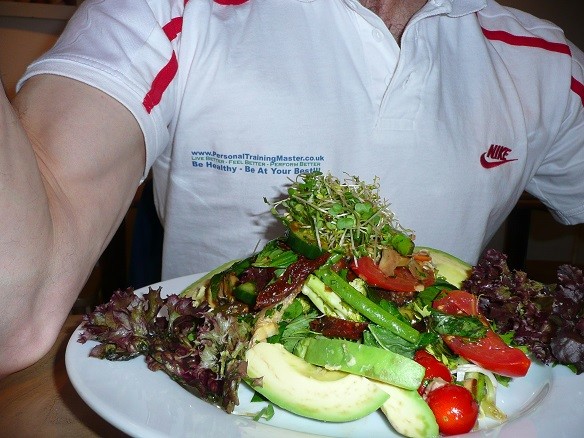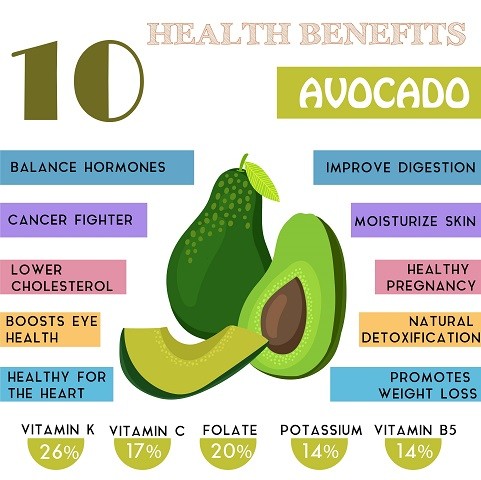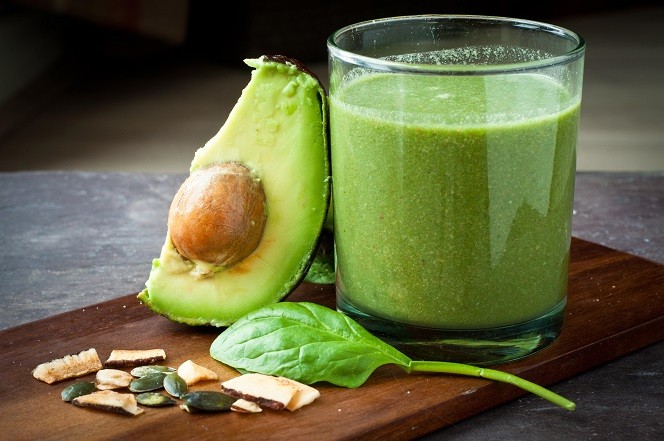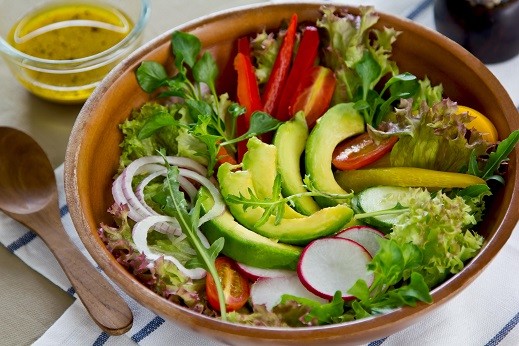The Mayan Indians have a saying: “Where avocados grow, hunger or malnutrition has no friends.” Have you ever talked with a nutrition consultant in London about weight loss and the avocados calories effects on losing weight and health?
Some people believe that fat intakes aren’t healthy thus, avoid fats at any costs. However, as you will see below plant based fat sources provide you with very powerful life enhancing benefits.

London nutritionist Jazz Alessi enjoys a colourful, delicious avocado salad, made of raw foods and garnished with life foods (sprouts) on the top.
Following a 8-12-week nutrition courses with a nutritious healthy diet plan can turn your life around.
As a certified nutritionist in London, in this evidence based article, Jazz Alessi spells out the avocado calories facts and effects on health.
Avocado – The Healing Fruit
Avocado (Persea Americana) is an exotic pear-shaped fruit known especially for its high fat content or monounsaturated fats, famous in modern nutrition for their immune enhancing, healthy weight loss effects through their metabolic benefits and anti-atherosclerotic effects.
These effects are documented by many studies performed on the Mediterranean diet.

The avocado extraordinary benefits, along with a significant content of micronutrients (potassium, vitamin E, vitamin K, vitamin B group), often places it on the lists of healthy weight loss nutritious, “healthy foods” used in many stages of adequately feeding the population. [1]
Research on this fruit do not mean that people should just simply add avocados to their diets since different foods create a different metabolic effect and we are all different.
Food items, their short and long term metabolic effects and nutritional intakes are best left with a nutritionist in London who guarantee that you are reaching your weight loss, fitness or health goals.
Avocado – Generalised research
Research published on avocado is promising as it shows that avocados included in a healthy diet reduced LDL cholesterol levels (low density lipoproteins).
“People should not just add an avocado to their diet, but it would be great to add such a fruit to a healthy diet,”
- Penny Kris-Etherton – president of the Nutrition Committee of the American Heart Association and nutrition expert at Pennsylvania State University. [1]
Avocado health benefits, content, identifications and origins
Every time you eat avocados, your body is supplied with an extraordinarily nutrition content coming from this nutritious fruit. Numerous studies have demonstrated that this food provides incredible sanogenic (healthy) properties.

Four Major Reasons To Add Avocado Into Your Dish. [2]
1. Avocado is on the list of foods with the highest nutritional value, containing an extensive array of nutrients, with some 20 vitamins and minerals.
Here are just some of the elements you find in 100 grams of fruit, according to the United States Department of Agriculture, Agricultural research Service – National Nutrient Database’ full report:
Calories
- Total Fat: 7% of the RDA (Reference Daily Intake);
- Sat fat: 3% of the RDA;
- Cholesterol: 0% of the RDA;
- Sodium: 0% of the RDA;
- Potassium: 4% of the RDA;
- Total Carbohydrate: 1% of the RDA;
- Dietary Fiber: 10% of the RDA.
Fats or fatty lipids are organic substances that constitute the largest source of energy for the body.
“Burning” one gram of fat releases 9 calories and about 15% of the human body weight is made, normally from fat.
The majority of the fat is stored in solid form in various organs like brain or in the skin, and a small part circulates in the blood in liquid form.
The fats stored represent energy reserves in emergency cases in which there is a lack of another source of energy due to physical efforts.
In starving situations, the mobilised stored fats will detach entering into the bloodstream, and once metabolised it will release the energy required for the vital activity of the organism. [5]
Vitamin
- Folate: 6% RDA;
- Niacin: 2% RDA;
- Pantothenic Acid: 4% RDA;
- Riboflavin: 4% RDA;
- Vitamin A: 1% RDA
- Vitamin B6: 4% RDA;
- Vitamin C: 4% RDA;
- Vitamin E: 4& RDA.
Vitamins help regulate metabolism, converting fats and carbohydrates into energy, and aid in the formation of bone and tissue.
- Vitamin A plays an important role in vision.
- The B-complex vitamins improve the body’s resistance to stress, help digestion and are useful for good muscle tone and a healthy skin. In addition, they reduce muscle spasms, cramps, numbness in the limbs and help regulate blood pressure.
- Vitamin C helps build tissues and strengthens the immune system.
- Vitamin D is useful for the cellular structure of the bones.
- Vitamin E is considered the most effective for maintaining the intracellular membrane body at an optimum level and prevents tissue damage caused by oxidation.
- Vitamin K is important in the process of blood clotting and has an important role in bone metabolism.
- Bioflavonoids have antioxidant, anti-inflammatory, anti allergenic, antiviral and anticancer properties.
Vitamins Overdose – Cautions
An overdose of vitamins will cause side effects:
- Excessive intake of vitamin A can be harmful to bones and skin, causing weakness and fragility.
- High doses of niacin can cause liver damage, peptic ulcer and/or rash.
- Vitamin B6 toxicity can damage the sensory nerves.
- And then there is a risk associated with the excess consumption of vitamin D… So, if you use supplements just, don’t overdo it! [6]
Minerals
- Calcium: 0% RDA;
- Copper: 2% RDA;
- Iron: 2% RDA;
- Magnesium: 2% RDA;
- Manganese: 2% RDA;
- Phosphorus: 2% RDA;
- Zinc: 0% RDA.
We all know that to live a healthy life our bodies require micro nutrients like, – minerals, vitamins, enzymes and phytochemicals.
Indeed, micro nutrients are not on the same stage with carbohydrates, proteins, fats and water, but they are equally important to enjoy a healthy life.

Minerals along with vitamins help the chemical reactions inside our body.
Each type of mineral has different functions.
For instance:
- Calcium, magnesium and phosphorus are vital to the composition of bones. Without these minerals, you are at risk of developing various diseases in the bones, which won’t be strong enough to cope with everyday activities.
- Iron: it enables the transport of oxygen from the lungs to the cells. In other words, once they reached the body, minerals are assimilated by the body and used within every individual to serve different functions.
Without minerals, we would be unable to perform our daily activities.
Depending on the amount needed, we have two groups of minerals, namely:
- Macro minerals (needed in larger quantities – calcium, magnesium and phosphorus) and
- Trace elements (needed in smaller quantities – zinc, manganese, selenium, potassium, iron, copper, chromium, iodine and boron).
Trace elements are needed especially in the growth process. All these minerals are stored in the body, bones or muscle tissues. [7]
What else you will get from avocado?
In addition, you will get small quantities of:
- Vitamin B1 (thiamine),
- B2 (riboflavin),
- B3 (niacin).
Avocado comes with approximately 160 calories, 15 grams of healthy fats and only 2 grams of complete proteins.
Although the 100 grams of avocado contain 9 grams of carbohydrates, 7 of them are fiber, which means that in fact there are only 2 grams of carbohydrates, essential for dieters low in sugars.
More importantly, avocado contains no cholesterol or sodium and has a very low percentage of saturated fat. [2]
2. Avocado contains more potassium than bananas.
Potassium is a nutrient that most people lack. It helps maintain the electrical activity (such as the heart) at the cellular level and participates in various important functions.
Avocados are a generous source of potassium, 100 grams representing 14% of the required daily dose, compared to only 10% covered by bananas, typically considered a food rich in potassium.
Several studies show that having a high potassium intake, the consumption of avocado helps reduce blood pressure, a major risk factor for myocardial infarction, stroke and renal failure. [3]
3. Avocado is full of unsaturated fatty acids, beneficial for the heart.
- Although avocado has a relatively high fat content, it is still clearly considered to be a healthy food.In fact, 77% of its calories originate from fats, which makes it the fattest food of plant origin but…
- Most fats in avocados are represented by oleic acid, a monounsaturated fatty acid, which is also the main component of olive oil, considered to be some of the most beneficial effects.
Oleic acid has been associated with the reduction of inflammation in the body and has been shown to have a positive effect on cancer-related genes. [4]

4. Avocado is rich in fibers.
- Fibers are other beneficial ingredients found in relatively large quantities in avocados.In this regard, sensible the use of avocado may contribute to weight loss, reducing the amount of sugar in the blood, and the risk for other adjacent diseases.
- A portion of 100 grams of avocado contains 7 grams of fiber, which is 27% of the recommended daily intake.
- About 55% of avocados contain insoluble fibers, the remainder being soluble. [2]
Foods are containing complex nutritional make up and intakes.
After foods are consumed they do exhibit different metabolic effects and at the end completely different biological effects.
1-2-1 lifestyle support from the best nutritionist in London includes customised 8-12-week nutrition courses, a nutritious healthy diet plan and nutrition coaching.
Jazz Alessi is an expert nutritionist and one of the best nutrition consultant in London.
Customised nutrition helps you completely transform your appearance and body shape, energy levels, exercise performance and health.
Start achieving your goals today.
Keen to get started?
Contact us now here.
References
1. Fulgoni, Victor L., Mark Dreher, and Adrienne J. Davenport. “Avocado consumption is associated with better diet quality and nutrient intake, and lower metabolic syndrome risk in US adults: results from the National Health and Nutrition Examination Survey (NHANES) 2001–2008.” Nutrition journal 12.1 (2013): 1.
2. Dreher, Mark L., and Adrienne J. Davenport. “Hass avocado composition and potential health effects.” Critical reviews in food science and nutrition 53.7 (2013): 738-750.
3. Zilberstaine, M., et al. “Potassium uptake by avocado roots.” Proc. Second World Avocado Congress. Vol. 1. 1992.
4. Borniquel, Sara, et al. “Nitrated oleic acid up-regulates PPARγ and attenuates experimental inflammatory bowel disease.” Free Radical Biology and Medicine48.4 (2010): 499-505.
5. Hill, James O., Edward L. Melanson, and Holly T. Wyatt. “Dietary fat intake and regulation of energy balance: implications for obesity.” The Journal of nutrition 130.2 (2000): 284S-288S.
6. Grandjean, Ann C. “Vitamins, diet, and the athlete.” Clinics in sports medicine2.1 (1983): 105-114.
7. Jew, Stephanie, Suhad S. AbuMweis, and Peter JH Jones. “Evolution of the human diet: linking our ancestral diet to modern functional foods as a means of chronic disease prevention.” Journal of medicinal food 12.5 (2009): 925-934.
Disclaimer: This website and all its content is to be used for information purposes only. This website or any of its content or links to third parties does not diagnose, advise, treat or cure any ailments, illness or disease.
You agree to hold harmless the owner of this site for any action taken on your own without consulting your medical doctor first by using the information on the website for diagnostic, treatment, or any other related purposes. This is not medical advice. If you are suffering from any illness, disease or ailments please contact your doctor first and immediately.



